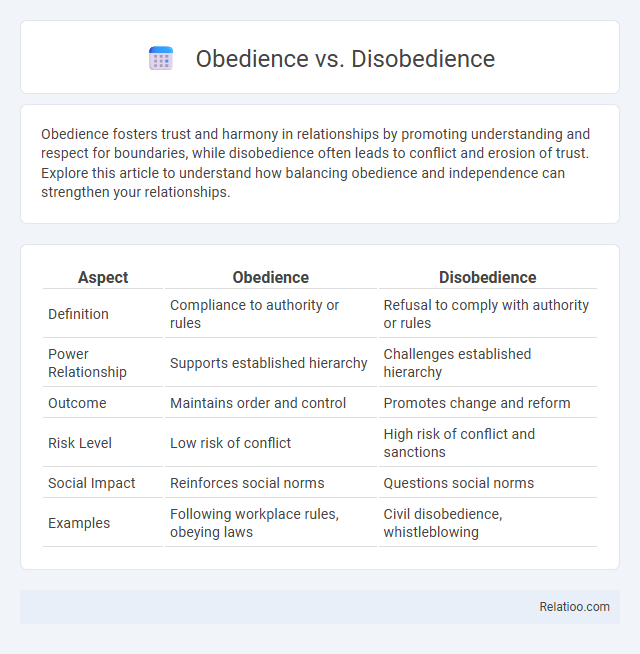Obedience fosters trust and harmony in relationships by promoting understanding and respect for boundaries, while disobedience often leads to conflict and erosion of trust. Explore this article to understand how balancing obedience and independence can strengthen your relationships.
Table of Comparison
| Aspect | Obedience | Disobedience |
|---|---|---|
| Definition | Compliance to authority or rules | Refusal to comply with authority or rules |
| Power Relationship | Supports established hierarchy | Challenges established hierarchy |
| Outcome | Maintains order and control | Promotes change and reform |
| Risk Level | Low risk of conflict | High risk of conflict and sanctions |
| Social Impact | Reinforces social norms | Questions social norms |
| Examples | Following workplace rules, obeying laws | Civil disobedience, whistleblowing |
Understanding Obedience and Disobedience
Understanding obedience involves recognizing it as compliance with rules or authority, often driven by social or moral expectations, while disobedience represents a conscious choice to resist or challenge those directives. Your ability to discern when obedience aligns with ethical principles or when disobedience is necessary for justice is crucial in navigating complex social dynamics. This balance shapes individual behavior and collective harmony, highlighting the importance of critical thinking in obedience-related decisions.
Historical Perspectives on Obedience
Historical perspectives on obedience highlight its role in maintaining social order and authority, seen in events like the Milgram experiment which revealed the extent to which individuals comply with authority figures. Disobedience has been equally significant, often serving as a catalyst for social change through movements like the civil rights protests that challenged unjust laws. Understanding these dynamics helps you recognize the complex relationship between authority, compliance, and resistance throughout history.
The Psychology Behind Compliance
The psychology behind compliance explores how obedience emerges from social influence, authority recognition, and cognitive biases, while disobedience often stems from moral reasoning, personal values, and perceived injustice. Studies, such as Milgram's obedience experiments, illustrate the powerful role of authority in shaping behavior despite ethical dilemmas. Understanding these mechanisms sheds light on how individuals weigh conformity versus resistance within social and hierarchical contexts.
Motivations for Disobedience
Motivations for disobedience often stem from a desire for autonomy, resistance to unjust authority, or conflicting personal values. Disobedience can arise when individuals perceive orders as unethical or detrimental to their beliefs, prompting actions rooted in moral courage. Understanding your motivations for disobedience helps navigate the balance between compliance and standing up against directives that challenge your principles.
Social Influence and Authority
Social influence and authority play pivotal roles in shaping obedience and disobedience behaviors, with obedience often driven by perceived legitimate power and social norms guiding compliance. Disobedience emerges when individuals question authority or perceive commands as unjust, highlighting the critical balance between conformity and personal morality. Understanding these dynamics empowers you to navigate social interactions, recognizing when to conform and when to assert personal autonomy.
Ethical Implications of Obedience
The ethical implications of obedience revolve around the tension between following authority and moral responsibility, where blind obedience can lead to unethical actions and disobedience may serve as a necessary act of conscience. Historical examples such as the Nuremberg Trials highlight how individuals must balance obedience with personal accountability to avoid complicity in wrongdoing. Your ethical framework should empower critical thinking, ensuring that obedience does not override fundamental human rights or moral values.
The Role of Disobedience in Social Change
Disobedience plays a critical role in driving social change by challenging unjust laws and societal norms that obedience often upholds. Your willingness to engage in civil disobedience can spotlight systemic issues and inspire reform, prompting communities and governments to reevaluate policies. While obedience maintains order, strategic disobedience acts as a catalyst for progress and the advancement of human rights.
Case Studies: Obedience and Disobedience in Action
Case studies on obedience and disobedience reveal critical insights into human behavior under authority pressure, such as Stanley Milgram's experiment, where participants complied with instructions to administer shocks despite distress. In contrast, acts of civil disobedience, like Rosa Parks' refusal to surrender her bus seat, demonstrate how disobedience can catalyze social change by challenging unjust laws. Your understanding of these examples highlights the powerful dynamics between authority, personal conscience, and societal impact.
Balancing Obedience with Critical Thinking
Balancing obedience with critical thinking requires recognizing the importance of following rules while evaluating their ethical implications and practical outcomes. Encouraging questioning and reflection helps individuals avoid blind obedience, fostering informed decisions that uphold personal and societal values. This equilibrium supports both social order and innovation by integrating compliance with thoughtful analysis.
Cultivating Healthy Forms of Disobedience
Cultivating healthy forms of disobedience requires understanding the balance between obedience, which ensures social order, and disobedience that challenges harmful or unjust norms. Your ability to critically assess rules enables constructive dissent that fosters growth and positive change without resorting to recklessness. Encouraging thoughtful questioning empowers individuals to navigate authority responsibly, promoting ethical resistance while maintaining societal harmony.

Infographic: Obedience vs Disobedience
 relatioo.com
relatioo.com